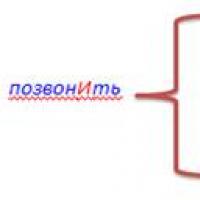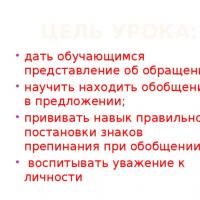After vacation back to work. How to get yourself ready for work after vacation: effective tips. How to get back to work after vacation
Vacations have one negative feature: they come to an end! And the point is not that you have to plunge back into everyday troubles (work, in principle, should be a joy, not a burden). The process of returning to one's duties is complicated. After all, the sea, sun, long sleep and other attributes of relaxation are left behind. And here the question arises: how to get ready for work after vacation?
In fact, achieving this is much easier than you think. And we will reveal several secrets that will allow you not only to fully relax, but also to get into the rhythm of everyday work with minimal losses. So, how to start working after vacation?
How to avoid becoming a victim of post-vacation syndrome
To more accurately identify the problem and find ways to solve it, scientists even came up with the term “post-vacation syndrome.” This is one of the types of depression, and, as you know, it is necessary to fight it.
Statistics show that most resignation letters are written after a long rest. People feel as if an overwhelming burden of tasks suddenly falls on their shoulders. In fact, most often the amount of work remains the same as it was before the vacation. However, in contrast to “doing nothing,” it seems as if there are many more responsibilities.
First you need to understand what exactly is meant by post-vacation syndrome. Here are its signs:
- depressed mood;
- sleep disturbances (including nightmares);
- attacks of irritability up to real anger;
- physical ailments (headache, indigestion, muscle discomfort).
To avoid these and other symptoms, you need to know how to repel the blow of the “enemy”. And plan your vacation (or long weekend) in advance, as well as prepare your way out of it.
Little secrets of productive rest
If we are talking about a standard working vacation consisting of 28 calendar days, psychologists recommend breaking it into two (or even three!) parts. It turns out that the optimal number of days, which is enough to rest, is a minimum of 7 and a maximum of 14. Having been idle for almost a month, there is a high probability of becoming another victim of post-vacation syndrome.
Statistics show that many people decide to spend their holidays away from home, including at sea. If the trip is long, you should worry in advance about how the body will tolerate acclimatization and jet lag. Be prepared that you may feel drowsy and apathetic on the first day. So don’t plan excursions, sports or other active activities during this time.
Most vacationers fall into two categories. The first try to visit all the sights in a short time, go around museums, buy souvenirs at markets... Others prefer to lie “like a vegetable” on the coast or by the pool. Both of these are fundamentally wrong! To ensure a complete rest, alternate passive pastime with active one. This way, you will come out of your vacation not only with a lot of memories, but also invigorated.
And one more important nuance: return to your native land no later than 3 days before the end of your legal vacation. This time is necessary to “reconfigure” your biorhythms to suit new way. Otherwise, you will have to go “to the machine” in a completely broken state.
However, very often vacationers prefer to spend their free time in their native land. And they make mistakes. For example, they are embarking on a lengthy renovation project. Or they lie on the couch all day, doing nothing. Neither one nor the other can be called a vacation! This means that getting back into work after such a “pseudo-vacation” will be extremely difficult.
Yes to fresh air and proper sleep
Let's consider another option: the “long” New Year and May holidays. On the one hand, in Russia they fit exactly into the ideal vacation duration of 7-10 days. Why do most people go to work extremely depressed?
It's simple. In this case we are dealing with holidays. And in our country they are most often accompanied by feasts, picnics and other entertainment events. There are few benefits from such a pastime, there is a lot of fatigue, and we do not get a feeling of complete relaxation. On the contrary, severe fatigue accumulates and a desire arises to rest more, but this time from the holidays themselves.
If after the New Year or May celebrations you want to go to work cheerful and rested, listen to our advice.
- It is necessary to give up long feasts with alcohol, which exhaust both body and soul.
- No need to lean on food. The average holiday table is full of unhealthy salads and appetizers. Better make healthy food choices!
- Get enough sleep. Each of us has our own biorhythms. But to have a good rest, a person needs about eight hours of sleep a day.
- Spend time outdoors, prefer walking. The fact is that the scourge of modern society is physical inactivity, that is, lack of movement. Vacations and holidays are a great opportunity to make up for its deficiency!

Vacation ends on Wednesday
There are a few more secrets that allow you to start working as productively as possible after your vacation. Few people know about them, but this is a real opportunity to reduce the chance of developing post-vacation syndrome to a minimum!
- Before going on vacation, close all current affairs. So that during your vacation, colleagues and management do not distract you with calls regarding unfinished tasks.
- Don't let your brain sit idle! Solve puzzles, read good books, if you really want to, call your colleagues yourself to find out about the news “from the front line.” Relax with the knowledge that vacation doesn’t last forever, and that’s great!
- Calculate your vacation so that you don't start work on Monday. The optimal day for this is Wednesday: a short work week will not allow you to get tired out of habit.
- A couple of days before going out, start going to bed at about the same time as your working days.
- On the first day, do not rush into work headlong and do not plan important meetings. Wipe the dust off the table; tell your colleagues about your vacation; have a tea party. This is quite enough for gradual adaptation.
Stimulus and motivation come first!
If you still don’t know how to get back into work after vacation, create an incentive for yourself. For example, on the eve of going out, go to a beauty salon, get a trendy haircut and a bright manicure. Update your wardrobe - so much so that you urgently want to show it off to your colleagues! In general, make sure that on the first morning of work you feel like the center of attention of the entire team.
Another effective piece of advice from psychologists: make plans. Good job brings not only pleasure, but also money. To begin with, imagine how you, a rested employee full of new plans, are happy to begin performing your duties, and how you receive a good salary. What will you spend it on? You can enroll in a dance school. Or you can start saving to buy a long-desired item.
Just imagine the pleasure you will get from owning it... Most likely, after these thoughts, the desire to go to work will become much stronger!
Or maybe it's not the holidays?..
It happens that even following all the above rules does not allow you to get rid of apathy, depression and bad thoughts. And this is already a good reason to reconsider your professional activities at the root.
Maybe you're recycling? Or are you in conflict with your superiors? Or are you categorically dissatisfied with your salary? Or have you dreamed of doing something else all your life? It is quite possible that we are not talking about post-vacation syndrome, but about total dissatisfaction with our current job. And then something really needs to change! After all, professional activity should bring pleasure, and not seem like hard labor.
The vacation has come to an end. It would seem that you can go to work with new strength and fresh thoughts, but for some reason you don’t want to! you feel very tired and dissatisfied with your job. There is no desire to work. Many people even think about leaving at this time. Well, post-vacation depression is evident.
How to get ready for work after vacation? Make work so that it’s a joy and doesn’t seem like hard labor? Some advise not to go on vacation for more than two weeks, so as not to fall out of the working atmosphere and quickly return to your usual schedule after the vacation. Others recommend not leaving your work at all, even calling up colleagues and, as they say, keeping your finger on the pulse. But is it worth following such recommendations? After all, it is almost impossible to relax and unwind, constantly thinking about work. In addition, your constant telephone conversations with colleagues will most likely offend the person with whom you went on vacation. How to relax, forgetting about work, and then make sure that going back to work after vacation does not become painful?
- First, decide how long you will rest and how you will spend your vacation. If you want to go to the tropics, take a vacation for at least 2 weeks. The fact is that while on vacation, you will have to undergo acclimatization, which will take several days. Imagine, your body has just begun to get used to humid air and high temperatures, and you expose it to repeated stress (and acclimatization is stress for the body) by returning too early. Naturally, going back to work after such a vacation will be painful. If you can afford to take a few vacations, spend it in a familiar climate zone. You can go to the country, visit relatives or friends;
- Remember the rule: “at work, I work, on vacation, I rest.” If you can separate these two types of activities, then after your vacation it will be easier for you to get into a business mindset. At the same time, we should not forget that rest is not everyday festivities until the morning... You can, of course, allow yourself to drink a little, but if you don’t know when to stop, then after a two-week alcohol marathon, the best place for you is not at work, but in the hospital ! So it’s better to focus your energy on restoring the body after;
- Try to return from vacation 3-4 days before going to work. This will help you re-acclimatize and get ready for work. Try to get more rest these days. You shouldn’t burden yourself with urgent household chores these days. You will be able to visit friends, give souvenirs you brought or make them at home at the end of the new work week;
- A couple of days before the end of your vacation, try to go to the same time as on weekdays. This will help set the body up for work after vacation;
- In the first working days after vacation, you should not take on new projects or overly complex tasks. It’s better if you finish a project you’ve already started, because finishing it is much easier than starting something from scratch. If there is no such activity, then start planning. Make a list of things you need to do in the coming days. By the way, you can do this a few days before the end of your vacation, then after the vacation you can safely begin to implement what you planned.
To avoid post-vacation depression, you need to adhere to these recommendations and allow your body to gain strength, energy and vitamins. Then it will be much easier to return to work after vacation. After all, you will not feel broken and empty. Work will be a joy, and new strength will help in the implementation of any ideas and projects.
And remember, proper rest is the key to productive work.
Our expert talks about how to easily return to the work rhythm after long holidays.
Nuria Arkhipova
Development Director at the agency for effective personnel management SLG
According to psychologists, the difficulty of adapting to normal life after a vacation depends on temperament.
It is better for phlegmatic and melancholic people not to break up their vacation into parts, but to rest for a long time and fully, otherwise getting back into work can take a long time and be accompanied by apathy and melancholy. Cholerics, on the contrary, are not recommended to take a long vacation: people of this type switch from one thing to another very quickly and can simply get tired from a long, busy vacation. This is easiest for sanguine people: they can choose any length of vacation without any consequences for their emotional state.
And a few more tips on how to get into a working mood.
1. Start “working” a couple of days before you show up at the office.
The surest way to smoothly return to work mode is to get yourself into a working mood one or two days before the end of the long weekend. Go to bed before midnight and get up at the time you usually get up when you go to work. As a result, the brain will begin to switch from a relaxed state to a working one, and when you return to the office, it will be easier for you to get into the rhythm of work.
2. Give yourself time to “unwind”
On your first day of work, you can give yourself a little slack, but don’t mess around! Even if your boss doesn’t assign you any tasks, keep yourself busy. Clean out your mail, put your documents in order. If possible, do not schedule important meetings in the first week. Don't forget that you weren't the only one having holidays.
You should also not stay at work longer than expected, especially if you are phlegmatic by temperament - people of this type tend to endure any inconvenience and discomfort for a long time, but in the end this leads to an “explosion” of emotions.
3. Remember why you love your job
If the first two tips did not help, several days have passed, and you still find it difficult to get into a working mood, it’s time to remember what attracts you to the business you are doing. Of course, we are not considering a situation where a person hates his job and goes to the office only out of necessity. Anyone who does something they don’t like doesn’t want to do it, regardless of holidays and weekends.
But if you are one of those who love their work, think about it: there are probably several positive moments - from the view from your office window to new interesting tasks and meetings with partners and colleagues. Concentrate on these thoughts instead of repeating to yourself over and over again, “Oh my God, I’ll go back to work tomorrow!”
If you are such a convinced introvert that just being in the company of other people is torture for you, you should think about working remotely.
4. Leave your dissatisfaction for later.
How a person feels at work largely depends on himself. For example, if you are choleric, which means that by nature you do not like being given instructions, you should think about working independently. In any case, there is no need to accumulate negativity in yourself and “infect” others with it by talking about post-holiday or post-vacation depression. Promise yourself not to be sad, and if you do give vent to your emotions, then do it for no more than 10 minutes at the end of the working day. Being stuck in this state is harmful!
5. Think about planning.
Do you know what is the best thing to do on your first day of work? Make a work plan. No matter how trivial it may sound, it has been proven that this approach helps to survive the “withdrawal” after a vacation much easier. And there are no secrets here - you just switch your consciousness, since creating a competent plan for what needs to be done in the near future is quite difficult.
But this method is not suitable for everyone. If you are a sanguine person, which means you are pedantic in everything and you need to clearly plan your actions in order to improve your work results, then this is for you. Choleric people also like to stick to a plan, although if something goes wrong, they can easily lose their temper. But phlegmatic people do not really like clear time limits, although in their work they prefer to make all the necessary calculations in advance.
If the phrase " I don't want to go back to work after vacation” is increasingly spinning in your head, and thoughts about how to go back to work after vacation haunt you, then you are close to post-vacation syndrome.
How to get ready for work after vacation
- Try to plan your vacation so that there are 2-3 days left before going back to work. During this time, you will be able to get used to the climate, time zone, and just get some sleep if you spent your vacation like a real tourist, sightseeing and going on excursions.
- Spend the last days of your vacation in peace. There is no need to rush to meet friends, attend social events or start a rearrangement. The best option now is to slowly and measuredly do pleasant things: walks in the parks, long sleep, self-care.
- Reminisce. Nothing can unsettle you more than returning from fairy-tale places to the gray landscapes of your hometown. Try to preserve the feeling of the holiday for as long as possible - sort through photographs, re-read travel notes, write to new acquaintances, leave reviews on resources for travelers based on your fresh impressions.
- First day after vacation. The main mistake of the first day after vacation is going to work on Monday. Monday is already a hard day, and Monday after vacation can plunge even the most rested employee into the abyss of despondency. If possible, try to return to the office closer to the middle of the week - on Wednesday or Thursday. The idea that there are only a couple of days before the legal holiday will not only have a beneficial effect on the general condition, but will also prevent post-vacation syndrome.
- Do not attempt to begin your duties immediately. Chat with colleagues, find out current news. It’s better to postpone important tasks that require attention until later (you only have two days before the weekend, you shouldn’t start something serious, right?). Under no circumstances should you deprive yourself of your daily work rituals - a cup of coffee or an afternoon walk will be those “hooks” that, if you grab hold of them, will help you quickly return to your work rhythm.
- At home, as at work, it is better not to make important decisions and spend the first weeks in a calm atmosphere. You shouldn’t immediately burden yourself and your family with all the household responsibilities. Everyday routine can be as serious a stress factor as the post-vacation rush at work. If you don’t want to cook dinner, go to a restaurant with your family or order food at home, and weekly cleaning can wait - your good mood for your household is probably much more important than the absence of dust and ironed shirts.
- Take care of yourself. Your body will be grateful if you add fresh fruits, vegetable salads and plenty of clean water to your diet for a few days. Remember, the simpler the food, the better, and it will save you from spending hours at the stove. If you really want to relieve the tension of the first week with the help of alcohol, then don’t be too hard on yourself. Evening memories of relaxation over a glass of wine will bring only positive emotions.
As for sports, oddly enough, the first days after vacation are not the best time to resume intense training. Even if you gained a few extra pounds over the holidays and you can’t wait to get back into shape, try to get into a sports regime gradually - instead of aerobics - yoga or Pilates, instead of an anti-cellulite massage - a sauna or relaxing wraps. And finally, the main advice - do it last vacation days only what you really want, without paying attention to recommendations that diverge from your desires. If you can't wait to meet your friends and show off your even tan, don't lock yourself in the house. If you feel that you are ready to move mountains at work, feel free to rush into battle. Just don’t forget that initial enthusiasm can quickly burn out, so take on all undertakings wisely.
Just yesterday you were fully enjoying your freedom, warming your belly on the beach, splashing in the pool and not knowing any worries at all, and today you are already collecting dust in a stuffy office, looking at the sad faces of your colleagues and the mountain of accumulated work that it seems you won’t have time to complete. and until the next vacation. Of course, this is a huge stress for the body. Some psychologists even came up with a term to characterize this condition - post-vacation syndrome. This disease affects about 40% workers returning from vacation. Let's take a closer look at what kind of animal this is - "post-vacation syndrome", and what it is eaten with.
Statistics tell us that 80-85% resignation letters are written by employees who have just returned from vacation. This is due to the fact that having given yourself a break in the form of a vacation, and then returning to work refreshed, it is easy to look at your work from the outside, analyze how dear it is to you and how satisfying it is to you. I would not recommend writing an application in the first week after vacation. The fact is that against the backdrop of post-vacation depression, it may seem to you that your job is completely unsuitable for you, but this Feelings can be deceiving. Therefore, postpone this decision until at least next week, and if the intention to leave this job does not disappear, then it is really worth writing a statement.
Causes of post-vacation depression
The reason for this disease is that during vacation the body adjusts to a new schedule. Everyone changes biological and psychological rhythms, emotional background, diet and sleep patterns, the amount of mental and physical activity changes. And if you are vacationing in a different climate and in a different time zone, then you can add to all this acclimatization. When you go back to work, your body has to adjust back to a strict schedule. This takes some time (usually 2-5 days). At this time, your body and spirit seem to protest against you causing yourself such stress. This is where physical and psychological ailments arise, the name of which is post-vacation syndrome.
If you use alcohol, then it is quite possible that on vacation you will often abuse it, which is also will negatively affect the body when going to work.
Symptoms
Post-vacation syndrome is accompanied a lot of unpleasant sensations, the most common of which are:
- Irritability
- Fatigue
- Lethargy
- Diffidence
- Hot temper
- Headache
- Pressure surges
- Insomnia
A person may even get sick acute respiratory infections– the body may well react in such a way as to extend its vacation.
Risk group
can defeat any worker, but there are some categories of citizens who are more at risk of experiencing all the delights of this syndrome for themselves.Dissatisfied with their work. If work does not bring any pleasure, and a person has to force himself to go to work just for the sake of money, then after several weeks full of positive emotions and vivid impressions, returning to an unloved job will be a very difficult ordeal.
Mentally unbalanced people. A sharp change in the rhythm of life, first of all, unbalances people prone to rash and impulsive actions.
Men. It is usually more difficult for men to get involved in work than for women. This is due to the fact that women have a more flexible psyche and they often go to work with pleasure, anticipating how they will tell their colleagues about their wonderful vacation and about the travels and adventures that took place on this vacation.
People who have long vacations. The clearest example is teachers. The longer the vacation lasts, the longer it will take to get into the rhythm of work.
People aged 40-45 years. At this time, many are experiencing the so-called middle age crisis. A person is overcome by thoughts about his own destiny, he tries to analyze the years he has lived and the mistakes he has made in his life. On vacation, he may well indulge in these philosophical reflections, but at work, problems with this may arise. Therefore, at this age, the return from heavenly pleasure to the harsh truth of life is especially painful.
So if you a mentally unstable man in his early 40s who works as a teacher and hates his job– I have bad news for you 🙁

But don't despair, friend! I have prepared some recommendations for you on how to how to return to work after vacation if not with pleasure, then at least by minimizing discomfort, depression And stress.
How to return to work after vacation
Get off vacation midweek. Try to plan your vacation so that the first day of work falls on midweek, and not at its beginning. Otherwise, the first week of work may seem unbearably endless to you.
Return from vacation 2-3 days before going to work. During this time, you will be able to slowly cool down from the impressions, get involved in the rhythm of the city, adapt to the weather and mentally tune in to work.
Don't spoil the last days of your vacation with household chores. After returning home from vacation, many try to redo the accumulated household chores in the last days of vacation, thereby poisoning these days for themselves. Women are especially guilty of this. No, I don’t encourage you to lie on the couch as a vegetable during the last days of your vacation, but there’s no need for excessive activity either. Try to find some balance. A little cleaning will be more than enough. You can deal with the rest of the matters later.
Think about work in a positive way. Remember why you love your job. Scroll through your head some positive moments related to your work and your colleagues. Imagine how, when you go to work, you will share impressions with colleagues, show photos and videos from your vacation, Maybe, give someone the souvenirs you brought. This positive attitude will help you get back into work easily, at ease and with pleasure.
Get enough sleep. To ease post-vacation syndrome, get enough sleep. Try to sleep at least 8 hours a day.
Plan your working time. A lot of work has probably accumulated during your vacation. There is no need to panic and take on everything at once. Plan your working time better. Deal with the main things first, and do the minor ones later. And don’t forget to be distracted every hour, especially if you have a sedentary job.
Put off making important decisions. Try to postpone all responsible and important decisions until the time when you get involved in work.
Try to spend your first working days "at ease". Don't overload yourself in the first days. Do a little cleaning, tidy up your desk, check your email. No labor feats in the first days! No need to stay late at work. If possible, try to leave early. And on your first weekend, try to have a good rest.
Don't worry if your thought processes are difficult. In a person who has been in the sun for several weeks, IQ decreases points by 20 . This discovery was made by German scientists. So, if you feel like you've gone a little stupid after your vacation, don't worry about it. In a few days IQ will recover.
Pamper your body with endorphins. Include some in your diet dark chocolate and more vegetables And fruit. It's better to take it from fruits oranges And bananas. These foods will nourish your body endorphins, which will make you feel a little happier. Don't forget also about morning exercises And walks in the open air. Drink more clean water. Among other drinks, pay attention to green tea And mineral water. But from strong tea And coffee It's better to refuse.
No drastic changes during this period.
If you have decided to change something fundamentally in your life, the first week after vacation is not the best time. After all, such changes require a lot of energy and, accordingly, can negate the positive effect obtained from rest. But if your hands are itching to change something in your life, start with the little things, and when you get into the working rhythm, then you can think about global changes.

Analyze your condition

Severe post-vacation syndrome is a sure sign that you are in the wrong place. People who work, as they say, "in its place" post-vacation syndrome is either mildly expressed or they are not familiar with this condition at all.
Personal experience
Personally, the last days of vacation are the hardest for me, and when I go back to work, I get caught up quite quickly. But in the last days of vacation, the mood is always at zero.

As for the duration of the vacation, I I like to go on vacation for a whole month. Several years ago I worked at an enterprise where I was provided with additional 14 days vacation. I took a vacation there once a year, all at once - for 42 calendar days. I don't like going on vacation 2 weeks- the subconscious does not perceive this as a vacation :) Moreover, in order to adjust from the work rhythm to the vacation, it also takes time - 3-4 days. And the last ones 3-4 days I'm already starting to think about work. So there is only a week of full vacation left. Whether it’s a matter of vacation 4 weeks! 🙂
Conclusion
Cutting transition from a relaxed state, which is missing discipline And obligations, and are present joy And pleasure, into a state of strict discipline is perceived by the body as extreme stress. The human psyche perceives the end of a vacation as a huge loss. The stress from such a drastic restriction of freedom can only be compared with parting with a loved one.
Have a smooth transition from vacation to everyday work! And let your work give you as many positive emotions as possible! Then you won’t face any post-vacation syndrome!
 All types of RNA. Structure and functions of RNA. Types and types of RNA cells
All types of RNA. Structure and functions of RNA. Types and types of RNA cells In which word is the letter denoting the stressed vowel sound correctly highlighted?
In which word is the letter denoting the stressed vowel sound correctly highlighted? Military Medical Academy named after
Military Medical Academy named after Presentation on the topic "appeal" Punctuation - spelling warm-up
Presentation on the topic "appeal" Punctuation - spelling warm-up “Indecent peace”: how the Treaty of Brest-Litovsk influenced the course of Russian history
“Indecent peace”: how the Treaty of Brest-Litovsk influenced the course of Russian history Political reforms of Peter I
Political reforms of Peter I Photos of military orders and medals of the USSR during the Great Patriotic War
Photos of military orders and medals of the USSR during the Great Patriotic War